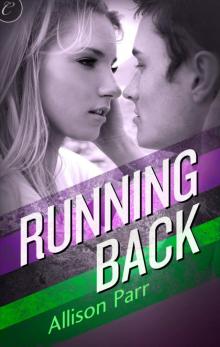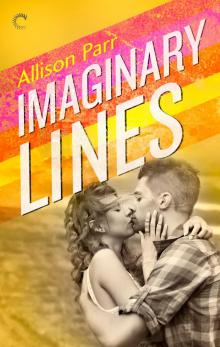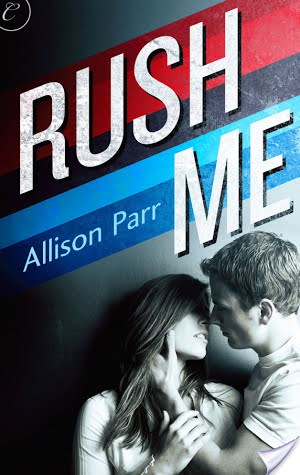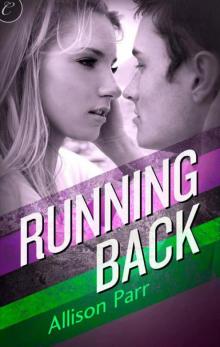- Home
- Allison Parr
Running Back nyl-2 Page 3
Running Back nyl-2 Read online
Page 3
She hung up and entered, and I couldn’t help speaking up as she walked by. “Sorry—are you working on a project about Brian Boru?”
She stopped, an expression of disbelief and excitement crossing her face, like a first year grad student stunned that someone actually had any interest in their research, and eager to expound.
By the time you asked anyone past their third year about their research, they usually just wanted to strangle you.
She smoothed a hand over her blue sundress and smiled. “Yeah—I’m working on a book about him.”
Competitiveness flared in my belly. I had a couple of papers published, but no books. Was this girl doing a multi-media thesis? Did that happen? “Small world. I specialize in Iron Age Ireland archaeology.”
“No way!” She dropped into the seat beside me. “Are you a grad student?”
“Yeah, Columbia. You?”
She surprised me by shaking her head. “Oh, no. I’m a collaborator on a historical satire series. My friend, though, the writer—she just got her degree at Chicago. But in Hellenistic Studies.”
“So how’d you guys end up working on an Irish hero?”
“It’s a whole series about historical figures—Alexander, Hannibal, Genghis Khan. So did you say—have you studied Brian Boru?”
“No, my field’s really a thousand years earlier.”
“Well, even so—do you mind if I get your info? If my friend could pick your brain...or if you know anyone else who works with that period...”
“Definitely.” I handed over my cell. “Is she in New York? I’d be happy to get coffee.”
“That would be great.” She typed in her number. “I’m Rachael, by the way.”
“Natalie.”
We shook hands.
“Ms. Sullivan? You can go in now.”
Both of us turned at the receptionist’s voice, which sounded much warmer than he had earlier. My stomach unclenched a bit. Maybe O’Connor had sounded pleased to see me.
“Just go straight down that hall—it’s the third door on the left.”
I practically leaped out of my seat, before remembering to pause and smile at Rachael. “It was nice to meet you.”
She lifted a hand. “See you around.”
* * *
I stood in front of the door, my finger tapping a rapid beat against my thigh. Okay. Fine. So he was an incredibly talented running back and gorgeous to boot. What did I care? I shouldn’t even notice the brilliant auburn hair that formed into loose curls, or eyes the color of streaming coffee, dark in shade, glinting mahogany in the light. Or by the fame and worship garnered by young heroes. No. I was not some young, foolish undergrad. I listened to NPR and paid for my own utilities and thought really hard about getting my own health insurance.
It was just that my parents’ insurance covered me until I was twenty-six.
At least it was O’Connor, not one of the other Leopards. He was the charming one. His modus operandi ran to bright grins and genuine laughter, and he was more likely to be in a Got Milk? or St. Jude’s commercial than one with fast cars and women. I’d watched six interviews before coming in, and he came across as genuine and good-natured in all of them, even the cell-phone video taken by a slightly obnoxious sixteen-year-old fan.
I’d just negotiate the contract with my usual aplomb and waltz out. And, you know, maybe he’d be super impressed by how bad-ass I was, because, well, archaeology. He’d say, “You’re an archaeologist? Really?” because that was what everyone said, and I’d smile—oh so coolly—and say, “That’s right, I just got back from a dig in Ecuador excavating Inka fortresses.”
I nodded briskly. I had this.
I straightened my back, imagining that a pole ran upward along my spine and kept my posture perfect. Then I rapped twice and pushed the door open.
Michael O’Connor stood framed in the window, sun highlighting the red-copper of his hair. A black athletic Leopards jacket clung to his broad shoulders, while work-out shorts hung down to his knees. Below them, the strong tendons on his calves were lightly tanned.
Now what? I didn’t even know how to address him. I couldn’t call him O’Connor, and Michael sounded too intimate, and Mr. O’Connor when he was only a few years older than me was ridiculous... “Michael O’Connor?”
He turned slowly and my heartbeat ratcheted up. For Pete’s sake, I had to get a hold of myself. I wasn’t interviewing for a job or trying to get funding. I wasn’t walking a survey across mountain cliffs or trying to chop down a tree with a blunted machete. I was just meeting a guy. A normal guy.
My lips parted, and I started to say you were great in the game against the Bears in December, and that drive where you practically front flipped into the end zone—I swear my heart stopped for two seconds—
And then I saw his face.
For a moment, I couldn’t place what was so strange. I thought it might be how the light haloed him, turning the moment into a ridiculously picturesque scene, with fire in his hair, light and dark and flame. But no, that wasn’t what sent shivers down my spine—it was how serious he looked. I’d never seen a picture of O’Connor without that effervescent grin, that twinkle in his eye, as though he was ready to sling an arm around a teammate or laugh with a reporter. Now, he looked deadly serious.
Unease washed through me.
“So. You must be Natalie Sullivan.”
“And you’re Michael O’Connor.”
Our hands clasped. His grip was warm and firm, but he applied more pressure than I expected. I raised my gaze to his and found him already looking at me. He regarded me with wary intelligence in his chestnut-colored eyes. I felt odd, and some of the butterflies woke up. I had to remind myself to breathe.
Then, so suddenly and smoothly I thought I’d imagined the wariness, he switched to a charming grin. He removed his hand and gestured at the seat before his desk as he dropped into a swivel chair behind it. “Please sit.”
I nodded and perched on the very edge. I shouldn’t be this nervous, but I’d never interacted with someone who I both admired and needed something from and was attracted to before. There were just too many feelings twisting up my gut.
Okay. I tried to order my thoughts. “First of all, I’m sorry about your loss.”
For half a heartbeat, his charming smile froze and his eyes flickered. “My loss?”
My finger ticked nervously against my thigh, and I quickly crushed it in the grip of my other hand. “Of your great uncle?”
His expression shifted back to ease, and he flashed a bright, shocking smile that made me flush straight to my toes. “That’s right,” he said, as though the memory had just now occurred to him. “Poor ol’ Uncle Patrick.”
He didn’t sound any more broken up than I felt.
“Um, yes.” I tried to recover from that smile.
“But you’re not really here to offer your condolences, are you, Ms. Sullivan? You want to talk about Kilkarten.”
“That’s right.” I shook myself and smiled again. “As I’m sure you know, your uncle and I had negotiated a deal regarding excavating the Iron Age harbor at Kilkarten Farm. I’m an archaeologist with Columbia University, and we’ll be partnered with an Irish university for the dig. I’ve emailed you the agreement, but I brought a paper copy as well.” I pulled the packet from my briefcase, wrinkling the paper on the way out. Why couldn’t I ever be suave? “I’m hoping we can keep the same terms that Patrick O’Connor and I worked out, and if you’re happy with them there are just a couple of forms to sign.”
He closed his eyes for one brief moment, and when he opened them they were focused on me with an intensity that made my own widen. He leaned forward and my throat dried up. “Look, Ms. Sullivan, I’ll get to the point. There isn’t going to be an excavation.”
Wait.
What?
“I’m sorry, I don’t think I understand.” I tried to keep my voice from warbling as I tucked my loose hair firmly behind my ear. “You object to the terms?”
“This dig’s beginning in a month,” I said dumbly.
He shook his head and spoke with finality. “No, it’s not.”
I blinked rapidly. “Why not?”
His expression didn’t change. “Personal reasons.”
Personal reasons.
Personal reasons?
Personal was seven years of school. Personal was Jeremy’s damaged reputation, years of research, a lifetime of love, conferences and papers and passion. It was bureaucratic tape and persuading cranky old men and academic feuds and my father’s disdain. “I don’t think you understand how important this project is.”
O’Connor’s hands twisted, his thumb and forefinger biting into the skin between his fingers. He smiled, and didn’t bother trying to make it reach his eyes. “Important means very different things to different people.”
My stomach turned over, like I’d only had coffee all morning long. “So you’re saying that...you’re not going to give me the rights to dig at Kilkarten. I’m going to have to cancel the excavation.” I blinked. “Can I do anything to make you change your mind?”
For the first time since I’d walked in, he betrayed some regret. “I’m sorry, but no.”
I nodded. “Oh.” There was a pit in my stomach, a knot that pulled everything in me down, that turned every emotion sour and made it hard to breathe. My body felt uneasy and weak and shaky. “I see.”
His brows lowered in slight consternation. “Can I get you anything? Water?”
I waved a hand. “No, I’m fine. Just—I don’t suppose you can tell me why?”
His face masked once more. “I’m sorry, it’s—”
“Personal. I get it.” I sucked in a deep breath and stood. I would have to call Jeremy. And the locals I had hired. And the suppliers I had contracted with for equipment.
And my parents. At some point, I would have to tell my parents I had failed. Well, at least someone would be happy with this outcome.
Standing, I swallowed dryly and stuck out my hand. “Well—thank you for your time.”
He took my hand, his own large and warm. His eyes scanned mine. “You’re really upset about this.”
That almost made me laugh. “You could say that.” I took a deep breath. “But. That’s not your problem.”
“Hey.” His hand held on to mine as I began to pull away, and my eyes rose back to his. “Do you think it’s really there? You think you would have found this lost harbor of yours?”
My chest clenched and my heart twisted. “I think I would have found everything at Kilkarten.” I extricated my hand and forced a smile. “Anyway. I guess I should go.” I shrugged. “Go Leopards.”
And then I left.
Chapter Three
I spent the next week running.
It was amazing, the amount of energy that unhappiness and stress created. Every time I thought about the loss of Ivernis or the meeting with O’Connor, another spurt of speed burst through me.
Now what? I couldn’t base my thesis off research that didn’t happen. I couldn’t study a site if I never found it. I would have to change my entire focus.
In the middle of circling Central Park’s giant reservoir, I came to a stop and stared blankly across the water at Midtown’s skyline, at the hotels and the towers of Times Square, and, off to the left, the familiar peak of the Empire State Building. Cam and I always joked about how scenes would go in the movie version of our lives, and I imagined this was the point where I would fall to my knees and start crying.
“Fuck,” I said, because if I wasn’t going to cry, something ought to mark the collapse of my dreams.
The water didn’t answer me. The trees, heavy with spring buds and the chirp of sparrows, swayed lightly. Behind me, fellow joggers bounced along in the sanctioned counter-clockwise direction, and tourists ambled to a stop every few steps, cameras clutched in hand. No one seemed to notice that the world had just ended.
I sighed and yanked my falling elastic out of my hair, flopping over at the waist so that the thick dirty-blond strands tumbled toward the dirt path. I gathered it in one hand before it trailed against the ground and bundled it back into a messy ponytail, and then readjusted my bobby pins as well.
Time to go home.
* * *
When Carthage fell, when Rome fell, bacchanalian chaos reigned in the streets. When Hailey’s Comet streaked through the sky, people fell into the arms of strangers.
Since this was on a slightly smaller scale, I ran and watched cat videos.
A week after Mike O’Connor had refused to sign the papers, Cam came home to find me once more in front of my laptop. She threw her purse into her room, where it landed with a soft thud. “What are you doing?”
I waved at my computer. “This cat’s trying to eat a watermelon. It’s adorable.”
She reached over and closed my laptop case. “Okay. No. You’re not watching cat videos for the rest of your life.”
“But I looked up things that make people feel better when depressed, and this came up.”
She shook her head. “You have to focus on the positives. Like, maybe we don’t sublet your room, but instead you stay here and we have the best. Summer. Ever.”
“Oh, I’m not staying here,” I said. “I’ve decided that I’m still going to Ireland.”
Cam’s eyes narrowed. “What? How does that make any sense?”
I shrugged. “Jeremy’s in Ireland. All the other specialists in our field are there. And even if I can’t dig at Kilkarten, I can still go look at the land, especially the public property surrounding the farm, and look at old records that are only available locally. It’s not ideal, but it’s better than nothing.”
“That’s stupid. You’re going to go there and stare at the land you can’t excavate? It’s going to drive you crazy.”
“Probably,” I agreed. “But it’s better than doing nothing at all.”
* * *
Two weeks after my failed meeting with Michael O’Connor, my brothers came into the city so we could go to the NFL Draft.
I’d been looking forward to it for months. We’d talked about going for the past several years, but since tickets were distributed on a first-come, first-serve basis the night before the Draft began, it took some organization. This year, though, Peter planned a whole trip up from DC with his wife and four-year old, who opted to see a musical. Quinn, who lived in Philly, bunked with Evan in his cramped Village apartment. And the night before the Draft began, the four of us spent hours in line to pick up wristbands that would give us entrance.
I was thrilled to see my brothers. I had bets placed on which teams would draft which players. But right before I was supposed to go meet my brothers to line up to enter Radio City Music Hall, nerves hit me hard.
“I’m just not feeling well,” I told Cam. “Maybe I should stay home.”
Cam looked up from her computer. “You’re kidding right?”
I shrugged. “I think I have a cold.”
“Hey.” Cam closed her laptop case. “Is this about O’Connor? You’ve liked the Leopards since you were five years old. You are not not going because he made you feel bad.”
I shifted uncomfortably. “Yeah. Just—what if he’s there?”
“You mean, what if he’s up on stage and you’re in the audience, so there’s actually no way of running into each other?”
I nodded several times.
“And didn’t you say most of the players are showing up on the second night? So maybe he won’t even be there tonight.”
“Okay. You’re right. I’m going, and I’m going to have a good time. And I’m going to meet Leopards and get— Oh my God.” I whirled back around. “What if I’m getting autographs and end up asking O’Connor for one? That would be humil
iating.”
Cam’s mouth quirked. “Or, alternatively, you could ask him for a signature and present the excavation contract.”
I stared at her. “Who were you in your last life? Machiavelli?”
She snorted. “Please. He just wrote The Prince to be satirical. He was really a good guy.”
“You keep telling yourself that.” I tipped my hat at her, gathered my things, and left.
I hadn’t been to Radio City Music Hall since some long ago Christmas, and my overwhelming memory was of long legs and camels. (While the camels also had long legs, I mainly remembered the human variety). No camels were present today, but it remained another sort of circus: of the media, the fans, the celebrities and players and coaches and managers and scouts. Excitement bubbled up in my chest as soon as we entered the concert hall, and the chatter of thousands filled the space. People in jerseys and nametags were everywhere we turned, and every so often we caught glimpses of people who usually lived in our televisions. I saw two famous coaches within the first twenty minutes and could have died happy.
The glitz didn’t just come from the people, but from the goods on display. We saw Lombardi trophies and Super Bowl rings. Banners and cameras were everywhere. Inside the hall, screens hung from the ceiling and along the back of the stage. The NFL logo was everywhere. Burnt orange and purple lights lit up the proscenium arch above the stage. The famous Art-Deco interior had been designed in the 1930s. Peter leaned close and told me, just as our father had a dozen odd years ago, that the stage elevators had been so advanced that the Navy had used their hydraulics for World War II aircraft carriers.
People packed the auditorium. We had seats, but around us others stood. The screens before us flashed with images, and the countdown began. It ended in a burst of cheers and applause and music, and then the NFL Commissioner walked out onstage. After a short speech, he officially opened the draft.
Round One began at 8:00 PM, but the Leopards, as one of the NFL’s best teams, didn’t pick until close to last. Selection order depended on rankings, and the lowest rated got the first position, so last year’s Super Bowl Champion was dead last, while the teams that didn’t reach the playoffs received the first twenty picks.

 Running Back
Running Back Imaginary Lines
Imaginary Lines Rush Me
Rush Me Running Back nyl-2
Running Back nyl-2